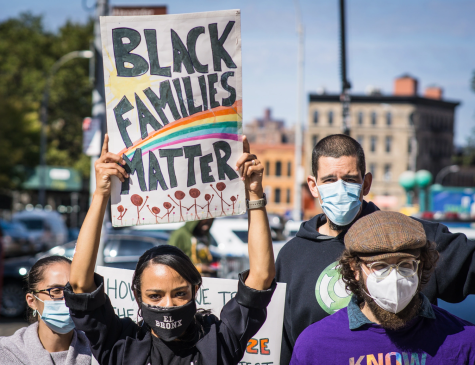Green card holders fear the new administration
March 8, 2017
Members of the Latino community, documented and undocumented, are looking for ways to formalize their presence in the United States because they fear they may be next on President Donald Trump’s “to-do” list.
Trump issued an executive order forbidding the entrance of people from seven predominantly Muslim countries into the U.S on Jan. 27, even though some had a “green card” — proof of permanent residence here. The ban was struck down by a court and is now in limbo as the president mulls over his options. A lot of Latinos listened to this on the news and they are more aware for their safety because the same thing may happen to them.
Up to 100,000 visas were reportedly revoked with the stroke of his pen on Jan. 27 when Trump signed the now infamous travel ban.
Trump’s executive order against predominantly Muslim countries also had an impact on Latino communities across the nation. On Feb. 21, memos about immigration were released and that included mass deportations, but they were going to prioritize the people who are here who represent a threat to public safety or have a criminal record, according to White House Press Secretary Sean Spicer.
Additionally, it may include people arrested for shoplifting and minor traffic offenses. Also, the new policies call for the hiring of thousands of additional federal agents, enlisting local law enforcement to expedite arrests and deploying more immigration judges, according to The Guardian. This puts many immigrants in suspense because if they do anything wrong, even as a simple mistake, it can mean deportation.
As Abigail Davila, a three-year resident of the United States, prepared to leave to Mexico on Feb. 4 to see her daughter, she was very anxious. “I am afraid not to be able to come back into the U.S.,” she said.
She said she has been hearing all kinds of stories in her community about possible restrictions. She has family in Texas, California and Mexico and her green card makes it possible for her to travel back and forth. But she says she feels that under the Trump administration, she may not be able to do that again.
She is one of an estimated 55 million Hispanics that make up 17 percent of the 320 million U.S. population in the United States, according to the U.S. Census Bureau. California, Texas and Florida have the largest communities. Some 11 million are reportedly undocumented.
The green card or permanent resident status can be obtained in several ways — most individuals are sponsored by a family member or employer in the United States, according to a Department of Homeland Security website. Others may become permanent residents through refugee or asylum status or other humanitarian programs.
Spanish TV and radio networks like Univision and Latina-USA advise the Hispanic community everyday to be aware of the news and of their rights.
Immigration attorneys and civil rights experts offer advice. They caution listeners not to allow immigration officials into their homes without a court order. Also, in the event they are detained, they remind listeners to ask for an attorney and refuse to sign any paperwork — especially not an I-407 form, which would voluntarily sign away permanent residence rights.
Immigration and Custom Enforcement federal agents arrested more than 680 people in a series of raids around the country, according the Department of Homeland Security, on Feb. 13. Roughly 75 percent were “criminal aliens,” DHS Secretary John Kelly said in a statement.
Customs Enforcement said the five-day operations were targeted like those they conducted periodically under the previous administration. However, immigration advocates and Democratic politicians in the affected areas — Los Angeles, Chicago, Atlanta, San Antonio and New York City — say that unlike the Obama administration, ICE now is overreaching by going after non-threatening individuals and scaring communities with public arrests, CNN reported.
Professor Sherman Lewis, a political science teacher at CSUEB, says he views Trump supporters as morally and pragmatically wrong on this issue, consistent with the most reactionary, corrupt, ignorant, dangerous, prejudiced, extremist, incompetent, demagogic regime since Andrew Jackson.
Lewis says Obama tried to strike a balance and was lambasted by both sides. One side is hostile to immigrants for cultural and economic reasons, but not informed, and the other wants open borders. Overlooked: the success of Mexico controlling its border with Guatemala; the need to have the U.S. help problem countries like Guatemala and El Salvador control their violent gangs and provide opportunity for kids in those countries.
The General Mexican Consulates in the Bay Area, San Francisco and San Jose, offer help to millions of Mexicans living in the San Francisco Bay Area with anything from legal status to attorney references. Immigration lawyers and attorneys suggest to stay calm and keep informed.

















